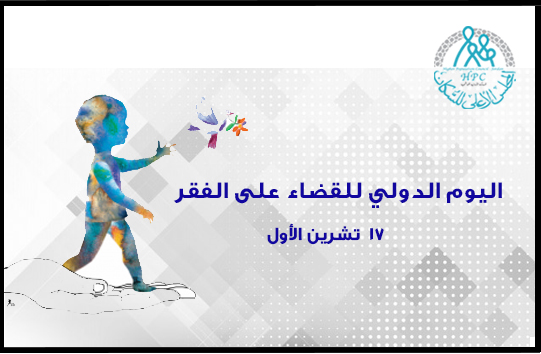

There is growing recognition of the multi-dimensionality of poverty, which measures poverty by looking beyond income to include other forms of deprivation in healthcare, education and standard of living at the level of individuals and households. It helps us to realize that COVID-19 came as a stark reminder that we need to look beyond income to address poverty in all Its forms.
HPC Secretary General, Dr. Abla Amawi, said in a press release on this occasion that according to the latest household income and expenditures survey by the Department of Statistics (2017-2018), the absolute poverty rate among Jordanians reached 15.7%, or 1.069 million Jordanians, while (extreme) poverty stands at 0.12%, which is equivalent to 7993 Jordanian individuals. The poverty gap reached 3.5%, while poverty severity was 1.2%. Amawi noted that the extreme poverty line is defined as the numerical estimate that is measured by the required minimum expenditure to cover the individual's and the household's needs of calories from basic foodstuff according to the dietary pattern of the community.
Amawi indicated that according to World Bank estimates, the global extreme poverty rate is expected to rise due to the Covid-19 pandemic for the first time since 1998 to reach 9% worldwide, and that the global economy will enter a state of recession, and the world will witness a sharp decline in per capita GDP. Amawi pointed out that the continuation of the crisis will wipe out almost all progress made in the past five years. At the national level, the pandemic has affected all households, particularly women, considering that informal labor constitutes about 48% of total labor in the Jordanian economy, according to a report by the Economic and Social Council entitled "The Covid-19 outbreak in Jordan, the primary response 2020."
Amawi provided that a review of the distribution of income and unemployment rates reported by the Department of Statistics in 2019, reveals that the unemployment rate among Jordanians amounts to nearly 19.1% (2 million persons) of the total population aged 15 years and above, reaching 17% among males and 27% among females. Indicators also show that the monthly income of 86% of the Jordanian workforce is less than JD 500, and that the Jordanian population is young and about to witness a demographic transition and a demographic opportunity.
HPC stated in the press release that in 2019 the Government of Jordan launched the National Strategy for Social Protection (2019-2025), in line with the pledge stipulated in its statement of priorities for (2019-2020). The strategy includes four main pillars (i.e., labor market, Social security, social services, and social assistance policies). The strategy is also in line with the Sustainable Development Goals, particularly SDG 1: "End poverty in all its forms everywhere", SDG2: "End hunger and achieve food security", and SDG 8: Promote sustained, inclusive and sustainable economic growth, full and productive employment and decent work for all”.
HPC explained that the Covid-19 pandemic affected the poor more than any other group of the population, especially the daily-paid workers, women, refugees, as well as workers in the private sector as well as other impacted sectors. HPC further added that the government has taken several measures within the framework of the defense orders that included establishing a Covid-19 Relief Fund "Himmat Watan”. Other measures included assessing the situation of workers who have been negatively affected by the pandemic, namely daily-paid workers in the construction, agricultural and tourism sectors, taxi drivers, workers in the public transport sector, and small business owners. In addition, the Central Bank of Jordan announced measures to contain the consequences of the Covid-19 pandemic.
HPC added that reducing poverty rates requires integrated, multi-sectoral and potentially more cost-effective policies that also include high-impact approaches to address intertwined forms of deprivation. These policies include economic expansion policies that allow greater economic participation and employment opportunities, boosting the productivity of the poor and their ownership of production assets, providing quality services to the poor in healthcare, education and public utilities, expanding interest-free microfinancing programs, empowering women, and providing comprehensive social protection for the poor.







